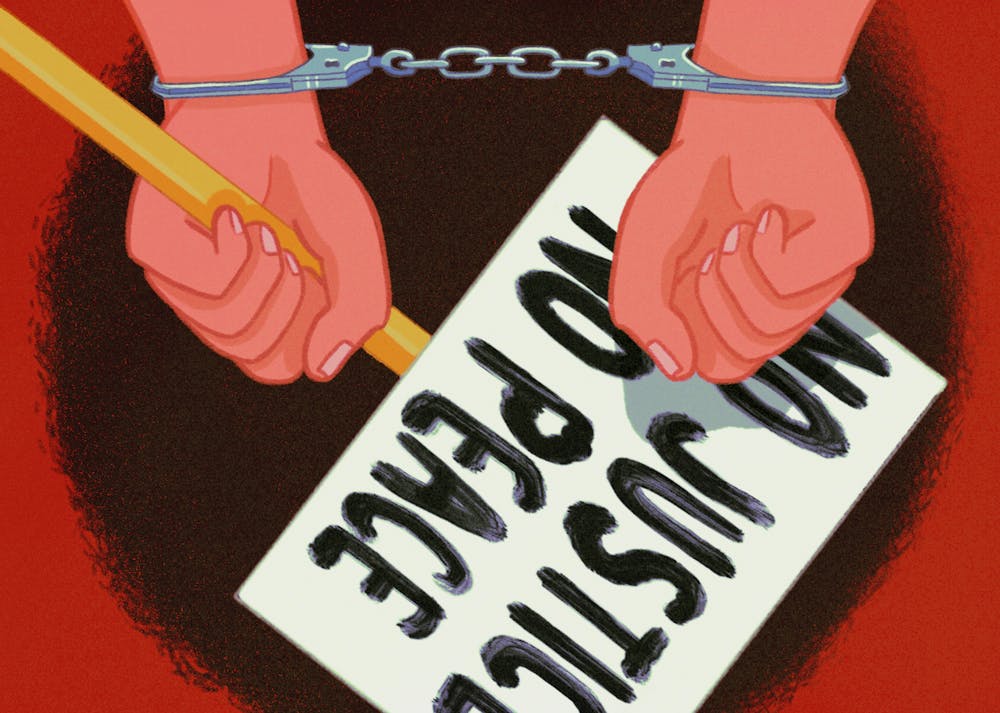A bill passed in the Arizona State House of Representatives would criminalize protests by increasing punishments for actions committed during "violent or disorderly assembly."
House Bill 2309, introduced and sponsored by 27 Republican representatives, would up the charges for aiming a laser pointer at a peace officer, obstructing a highway or public street and committing a "public nuisance" from misdemeanors to class six felonies if committed during a "violent or disorderly assembly." It passed through the House March 3, and is now making its way through the Senate.
The bill defines "violent or disorderly assembly" as a group of seven or more persons who, "with the intent to engage in conduct constituting a riot or an unlawful assembly," causes property damage or injury to another person.
State activists have decried the bill as a retaliation against the Black Lives Matter movement and a target on the backs of communities of color. Student groups are worried the bill will discourage students from getting involved with their local government.
"We see this bill as a scare tactic from students being able to freely express their voices and their opinions on a lot of the decisions being made that affect students," said Armando Montero, the director of ASU affairs at the Arizona Students' Association and a sophomore triple majoring in political science, economics and math. "One of the main reasons that we as an organization are opposed to this bill is that for many college students, this is the time where they’re kind of finding their political identity and what they believe in and where they fall in the political world."
For Taylor Miller, a junior double majoring in biological sciences and justice studies, protesting is an important part of how she expresses her beliefs, but a class six felony on her record would possibly destroy her future.
"Reading this bill really alarmed me because it raises the penalties to felony offenses and I was in Phoenix protesting, I was blocking streets in downtown Phoenix with everybody else," Miller said.
If arrested for these charges, a person would be kept in police custody for 12 hours. If convicted, they would be prohibited from obtaining state and local benefits such as welfare, scholarships and public housing, employment by the state, cities, counties or towns and would lose their right to vote.
"I want to be a lawyer, and if I'm convicted of a class six felony, it's going to be much harder to become an accredited lawyer by the bar association," Miller said.
LETTER TO THE EDITOR: Arizona House bill harshening penalties for protestors targets student voices
Bills like HB 2309 have become commonplace in the aftermath of BLM protests and the 2020 election. As many as 45 states have considered 216 bills which would restrict protests, and 26 of them have been enacted. HB 2309 is among 76 bills currently making their way through state legislatures across the country.
Several states have considered bills restricting or criminalizing protests on college campuses. Georgia's state Legislature passed a bill requiring universities to sanction student protestors.
"Arizona doesn't have a policy yet on campuses and universities, (but) I wouldn't be surprised if we saw that happen soon," Allan Colbern, an associate professor at the School of Social and Behavioral Sciences said. "Often these states are modeling their policies off of each other."
For students looking to protest even if this bill is enacted, Colbern recommends getting a permit for a peaceful protest and being cautious when interacting with law enforcement.
"This bill empowers them to detain you if they think you are crossing that line from protester to rioter," Colbern said.
HB 2309 will be read and debated in the Senate Judiciary Committee on March 18.
"We hope the bill won't actually pass both chambers and be signed into law, but ultimately we still have a right to peacefully protest, to express our opinion, and I know a multitude of organizations on campus are finding new and creative ways to be able to express their voices," Montero said.
Reach the reporter at rpriest2@asu.edu and follow @reaganspriest on Twitter.
Like The State Press on Facebook and follow @statepress on Twitter.
Continue supporting student journalism and donate to The State Press today.

Reagan Priest is a managing editor, overseeing and working with the six digital desks at The State Press. She previously worked as a social justice reporter for Cronkite News and as a digital production intern at The Arizona Republic.




